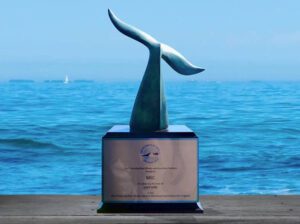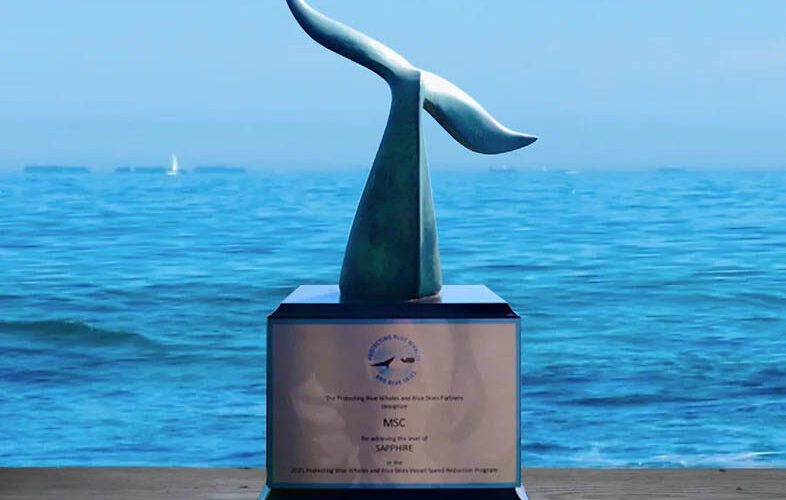
Over a dozen shipping companies, including MSC, Maersk, Yang Ming COSCO and K Line received awards in September for reducing speeds in and around California waters as part of the “Protecting Blue Whales & Blue Skies” program.
A total of 19 shipping companies participated, transiting at 10 knots or less in the San Francisco Bay Area and the Southern California region. The program’s Southern California region extends from Point Arguello in Santa Barbara County to waters near Dana Point, south of the Los Angeles and Long Beach seaports.
The “Protecting Blue Whales and Blue Skies” program is a collaborative effort by a number of local and regional air pollution control districts; multiple national marine sanctuaries; a handful of marine sanctuary foundations; the Scripps Whale Acoustic Laboratory/Scripps Institution of Oceanography, and other organizations.
The latest version of the voluntary incentive program ran May 15, 2021 through November 15, 2021. Shipping companies receive awards based on the percent of distance traveled by their vessels through the Vessel Speed Reduction (VSR) zones at 10 knots or less and with an average speed of 12 knots or less.
The 10-knot target complements the National Oceanic and Atmospheric Administration’s (NOAA) and U.S. Coast Guard’s requests for all vessels (300 gross tons or larger) to reduce speeds during the months of peak endangered blue, humpback and fin whale abundance to protect the whales from ship strikes.
Ship strikes are a major threat to whales globally and to the recovery of whales in California waters. Reducing the risk of ship strikes is a major priority of NOAA’s, including NOAA’s West Coast national marine sanctuaries. Observed and documented deaths totaled 51 endangered whales from 2007-2021, and may represent only a fraction of the total number of ship strikes taking place annually.
The timing of the program also coincides with the season when smog concentrations are typically high. The 10-knot target allows ships to travel at an efficient operating load using less fuel and producing less pollution. Ocean-going vessels transiting the California coast generate nitrogen oxides (NOx, a precursor to smog), sulfur oxides (SOx), particle pollution and greenhouse gasses (GHGs).
These vessels account for nearly 200 tons of NOx per day emitted off the coast of California. The areas of greater Los Angeles (including Ventura County), Santa Barbara County, and the San Francisco Bay do not meet the state and/or federal air quality standards for ozone, according to state environmental data.
Three award tiers recognize participating companies based on the percent of distance their fleet traveled through the VSR zones at speeds of 10 knots or less. The three award tiers are Sapphire (85-100% of fleet total distance in VSR zones traveled at 10 knots or less), Gold (60-84%), and Blue Sky (35-59%).
Automatic Identification System (AIS) transponders on each ship transmit the ship’s speed and location; AIS data was analyzed for each fleet and the company’s performance was classified by tier. Companies that performed at the Gold or Sapphire level were awarded a financial incentive.
For the fourth straight year, Mediterranean Shipping Company (MSC) achieved the Sapphire tier in the large fleet category and demonstrated that planning enables ships to reduce speeds in VSR zones without disrupting operations. In 2021, MSC traveled more than 23,000 nautical miles at 10 knots or less.
“At MSC, we refuse to be complacent, and recognize that we must all do our part to protect marine life,” MSC General Manager of Port Operations – West Coast Stanley Kwiaton added. “We are proud of our work to date and look forward to working with partner organizations to set an industry example.”
“A commitment to sustainability is at the core of MSC’s business objectives, and we strive every day to provide solutions for the most pressing challenges of our time, by voluntarily reducing speeds to protect endangered whales while raising awareness of this important issue,” he added.
Swire Shipping achieved the Sapphire tier in the small fleet category with 1,500 nautical miles at 10 knots or less. For their outstanding commitment, the two companies earned the Protecting Blue Whales and Blue Skies Whale Tail award.
“We first joined the program four years ago because we believed in its purpose. It’s been very encouraging and inspiring to see how our actions and how the collective effort of our peers and industry partners can and have made a difference to the communities and marine environment that we depend on,” Swire Operations Manager for North America Mugurel Calin said.
Shipping companies that participated in the 2021 program reduced their air pollutant emissions by 650 tons of NOx and 22,201 metric tons of regional GHGs, according to the program’s directors.
For example, this equates to the GHG emissions from 4,784 passenger vehicles driven for one year, or the amount of GHGs produced by charging more than 2.7 billion smartphones. These numbers represent about a 25% reduction in NOx pollution from the ships that participated in the program, as compared to baseline conditions.
Incentives ranged from $5,000 to $50,000 per company in the Gold and Sapphire award tiers. Seven companies —MSC, COSCO Shipping Lines, Maersk, Ocean Network Express (ONE), Wallenius Wilhelmsen, Yang Ming, and Swire Shipping—all declined their financial incentive payment, with those funds being reinvested in the program.
“As a pioneer in ecological environment protection in the global liner industry, COSCO Shipping Lines attaches great importance to ecological environment protection and incorporates the concept of low carbon and high efficiency into its comprehensive management policy,” COSCO Shipping President of Los Angeles Dong Hao said. “VSR program accord with our sustainability goal, and we will continuously do our best to participate in and promote green and low-carbon shipping.”
“All life on Earth started in the ocean, and the ocean nurtures everything that makes it possible for us to live on the planet,” Yang Ming Vice President of Marine Operations Leo Chiang added. “That is why Yang Ming recognizes our responsibility to give back to the ocean and all lives living in it.”
“We are particularly honored to participate in the Protecting Blue Whales and Blue Skies program and work with NOAA and those who share the same value to protect the endangered and threatened whale populations,” he continued. “Yang Ming will continue to step up our efforts to protect the ocean and our planet and build a sustainable future.”

